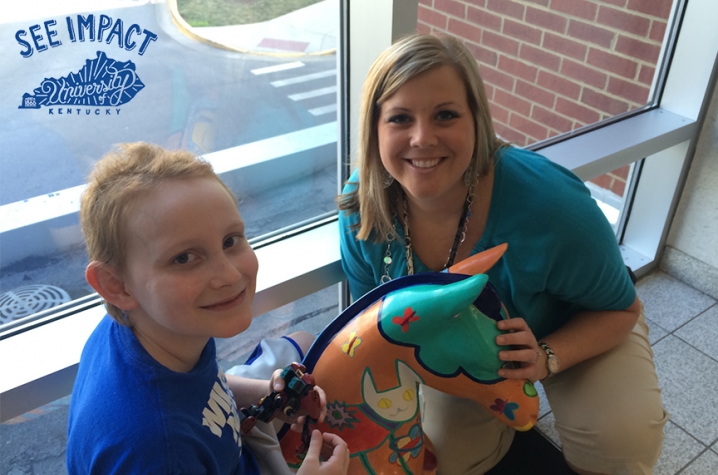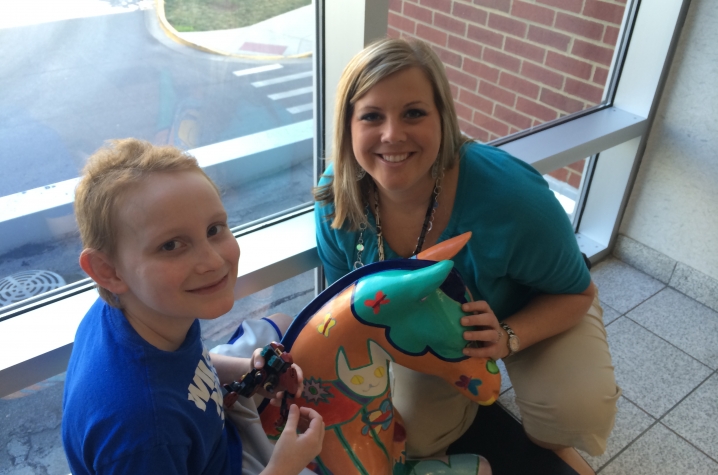PAWS Program Prevents Patients Battling Cancer from Falling Behind in School
LEXINGTON, Ky. (July 10, 2015) — In the Melton household, the reality of fighting cancer was never an excuse to stay home from school.
So, like most second-graders in Science Hill, Kentucky, Kelly Melton started public school in the fall of 2014. Unlike his classmates, Kelly, a patient at the DanceBlue Kentucky Children's Hospital Hematology/Oncology Clinic, went to school with a compromised immune system. A month and a half later, he ended up back in the hospital because of complications with his disease.
Ever since Kelly was diagnosed with Leukemia in 2012, the Melton family's primary focus has been getting Kelly well again. But despite the frequent late-night trips to the UK Emergency Department and routine inpatient chemotherapy treatments at Kentucky Children's Hospital, Kelly's mom Lisa refused to watch Kelly slip behind in his education. When he was well enough to go, Lisa Melton sent her son to school.
"In our home we think education is one of our top priorities," Lisa Melton said. "We couldn't allow him to not take his education seriously."
For nearly two years of Kelly's treatment, Lisa Melton was responsible for communicating with the school system about Kelly's missed days and coordinating at-home learning opportunities. In addition to taking care of a young child and managing doctor's appointments, Melton was tasked with meeting with school administrators and filing paperwork for special learning accommodations for her son. Now, a new program at the DanceBlue Clinic, which is funded in part by the DanceBlue Marathon and the nonprofit Cowboy Up for a Cure, provides a school intervention specialist to serve as a liaison between educators and the medical teams and families of children who must miss school to fight cancer.
With many families needing assistance with education during a child's cancer treatment, the DanceBlue Clinic introduced the Providing Assistance With School (PAWS) program in August 2014. Courtney White, a certified K-12 teacher who has taught general education as well as special education, was the first interventionist hired with PAWS.
White performs multiple roles, including individualizing academic programs for children unable to attend traditional school hours, communicating with doctors about the learning capabilities of each child, teaching educators in the school system about how cancer treatment interferes with a child's daily life, and working with families to ensure a child remains engaged in learning activities at the home, hospital or school. White accommodates children who are physically unable to attend school on a regular basis by arranging for Homebound, a state-funded program permitting students to progress academically at home with two visits per week from a certified teacher.
"With Courtney helping us, he could have Homebound on a more consistent basis," Lisa Melton said. "As a parent, you don't always know these things. You are so wrapped up in getting your child well that some things fall behind."
Before accepting the job with PAWS, White served as a volunteer for the Kentucky Children's Hospital pediatric oncology survivors' picnic and attended a couple DanceBlue marathons. She remembers crying through her first DanceBlue Marathon.
"I was just in awe over the commitment of the students and their willingness to make a difference," White said of her first DanceBlue experience. "The support of DanceBlue makes me want to be in this position — I know I am not alone in this job."
As part of her position, White advocates at the state legislative level for laws accommodating at-home education for pediatric oncology patients. White is pushing to reform laws to increase the number of Homebound instructional hours to five per week for children who are receiving education at home due to illness. She would like to see laws allowing children who miss school for serious illness to have the opportunity to make up more lost hours through Homebound sessions. Currently, in all Kentucky jurisdictions, missed days at school cannot be made up through Homebound, even when a child misses school as a result of the cancer treatment process.
White also assists children with re-integrating back into the school system once their treatment period has come to an end. Chemotherapy and other medications during cancer treatment can stall a child's cognitive development long-term. White can help recommend special education for children encountering learning disabilities.
Dr. Lars Wagner, the chief of pediatric oncology and hematology at Kentucky Children's Hospital, said White's position and the PAWS program was only possible through fundraising efforts of students and the local community. The PAWS program widens the scope of services provided to families at the DanceBlue Clinic. Wagner said offering this kind of specialized service to patients puts the DanceBlue Clinic on par with some of the top pediatric oncology centers in the country.
"Many parents don’t understand what could be accomplished in the school system or how to educate their child fully," Wagner said. "The PAWS program adds a more comprehensive dimension to the care we give kids."
According to Wagner, 80 percent of pediatric cancer patients will survive and grow up to become adults. He believes cancer treatment shouldn't cause major setbacks for people at such a young age. With the PAWS program, Wagner hopes his patients will seamlessly transition back into academic environments and leave the cancer journey behind them.
MEDIA CONTACT: Elizabeth Adams, elizabethadams@uky.edu






